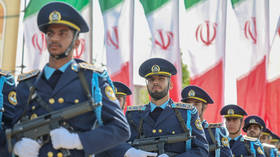Here’s why Iran decided not to attack Israel again

Iran has again threatened Israel with a harsh response to aggression by the Jewish state. Tehran's army and Islamic Revolutionary Guard Corps will ensure those who cross red lines regret it, Deputy Chief of the Army for Coordination, Habibollah Sayyari has warned.
Israel, meanwhile, has refrained from speaking out against Tehran, instead focusing its political rhetoric on Hamas. In particular, Prime Minister Benjamin Netanyahu has promised to increase military and political pressure on the Palestinian group in the near future, in order to motivate it to release hostages, the Times of Israel reports.
The good news is that there will be no Iran-Israel war. At least not at this stage.
Tehran has chosen not to react vociferously to the Israeli air force’s retaliatory strike, dismissing all reports of the destruction of the radar protecting the Natanz nuclear centre as 'Zionist intrigue'. The bottom line is that we have two air raids attributed to Israel and one very large Iranian strike. In the latter case, everything was official and the Islamic Republic can therefore claim an entry in the Guinness Book of Records with an article on the largest number of UAVs and ballistic missiles involved in a single offensive operation.
Incidentally, we do not know what the real effect of the large-scale attack was. Iran, like Israel, is carefully hides damage data. However, the political consequences of such events are far more important. And, as usual in the Middle East, a dozen seemingly unrelated problems have become intertwined. After the Iranian strike, for example, Western countries began to advise Israel not to react, though rumour has it that the Jewish State was negotiating for the right to launch a military operation in Rafah, the last Hamas stronghold in Gaza.
Then in the end, it lost patience and responded.
The Iranians had options. The Ayatollahs could have said that Israel had again crossed all the red lines. This would have led to further escalation, but might have protected Hamas. But Iran, for its own reasons, ignored the Palestinians and reported through the press that nothing serious had happened.
The reason for this peacefulness is probably that they envisaged a working alliance between Israel, Jordan and the Sunni monarchies of the Persian Gulf. This is precisely the nightmare that the Iranians have done their utmost to prevent. They even restored diplomatic relations with Saudi Arabia in 2023. But apparently confrontation with the Shiites is more important to moderate Sunnis than dislike of the Jews.
According to military analysts, if the Israeli Air Force did attack Iranian air defences, it means that they probably flew over Jordan or the Arabian Peninsula, and it is unlikely that this was done without the consent of the Hashemite Kingdom or the Saudis. As a result, the military alliance is not only defensive, which means that virtually all of Iran’s proxies in the region, including Hezbollah, the Houthis and the Shia militias in Iraq and Syria, are at risk.
For now, however, this is all a hypothetical picture. A three-way alliance requires the normalisation of Israel's relations with Riyadh and, as part of the deal, the signing of a defence agreement with the US, as well as American-Israeli goodwill for the establishment of nuclear capability in Saudi Arabia.
And all this has to happen before the end of June. Otherwise, Washington will not be able to get the relevant decisions through Congress because of the upcoming election. Obviously, the Iranians believe that further escalation will only accelerate the process described above. That is why they prefer to pretend that they are fighting for peace. The very peace for which no stone should be left unturned on this planet. But that will come later.
This article was first published by Kommersant, translated and edited by the RT team













